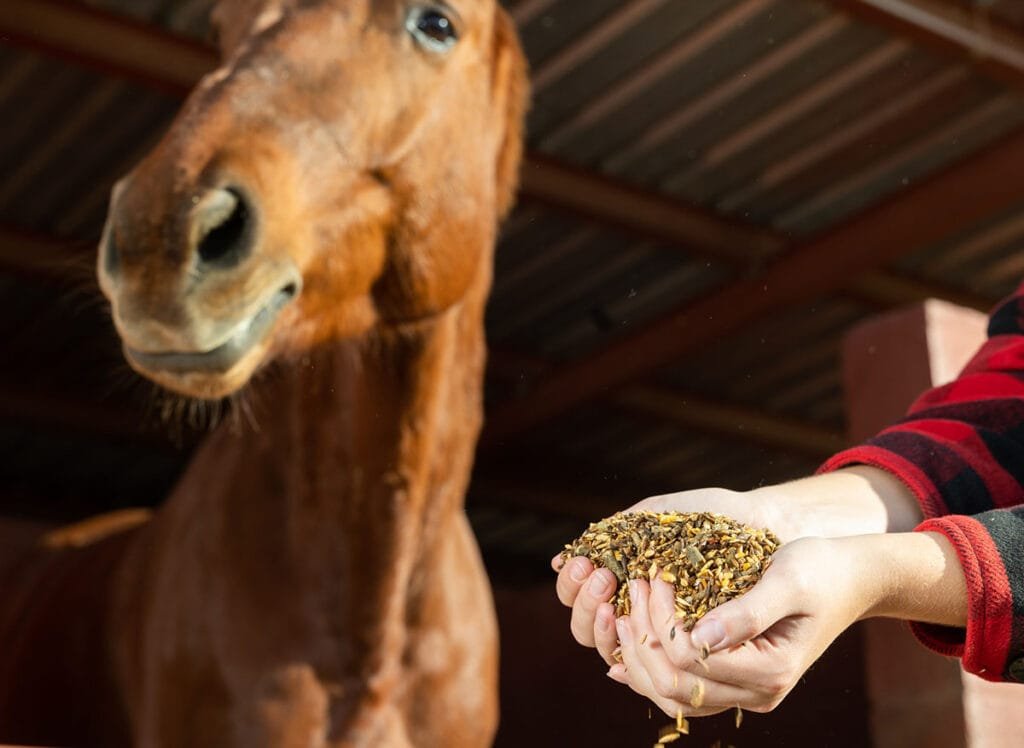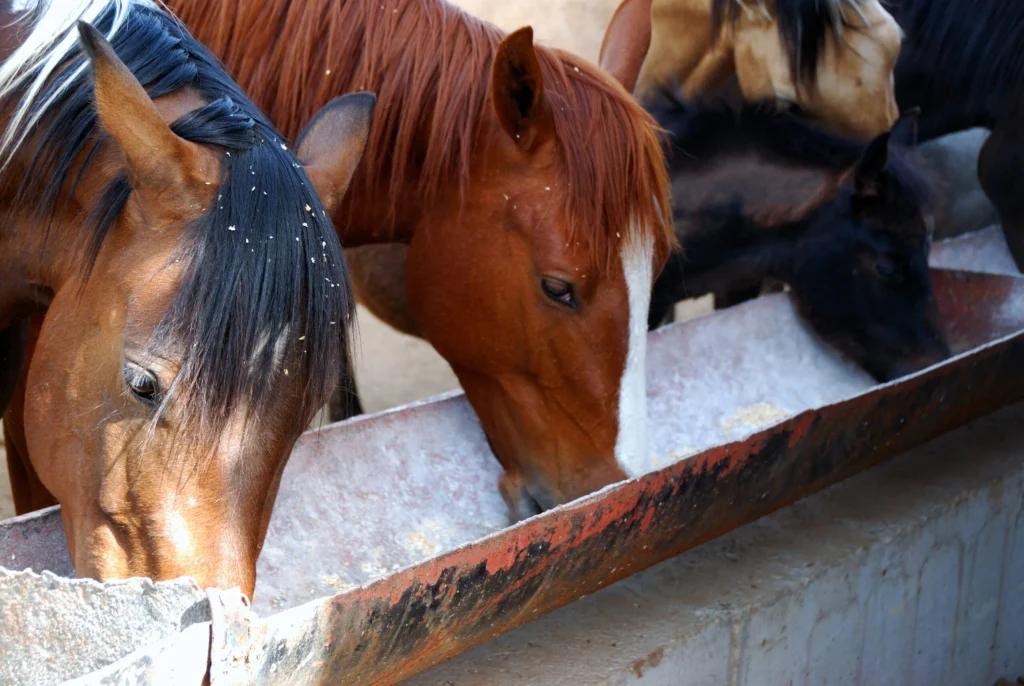As a horse owner, providing the best nutrition for your horse is essential for maintaining its health, energy, and overall well-being.
However, feeding horses is not as straightforward as it may seem. Many horse owners unknowingly make nutritional mistakes that can negatively impact their horses. Whether it’s overfeeding, underfeeding, or choosing the wrong type of feed, these mistakes can lead to various health problems and even long-term damage.
In this article, we’ll explore some of the most common nutritional mistakes made by horse owners and provide tips on how to avoid them.
1. Overfeeding Grain and Concentrates
One of the most common nutritional mistakes is overfeeding grain-based concentrates, especially for horses that are not heavily worked or in need of weight gain. Grains such as oats, corn, and barley are high in carbohydrates and can cause weight gain, obesity, and even metabolic disorders like insulin resistance and laminitis if fed in excess.
How to Avoid This Mistake:
- Feed concentrates based on your horse’s level of activity. Performance horses, pregnant mares, or horses in heavy training may require more concentrates, but for most horses, especially those at rest or lightly worked, forage (like hay and pasture) should be the primary food source.
- Always consult your vet or an equine nutritionist to determine the correct amount of grain for your horse’s needs. It’s essential to feed according to their activity level, body condition, and breed type.
- Gradually introduce any changes to your horse’s grain intake to prevent digestive upset.
2. Not Providing Enough Forage
Forage, such as hay and pasture, is the foundation of a horse’s diet. It provides the fiber necessary for proper digestion, gut health, and general well-being. A common mistake is not providing enough forage or feeding forage of poor quality. This can lead to digestive problems, including colic, and may cause behavioral issues like boredom or excessive chewing on non-food items.
How to Avoid This Mistake:
- Ensure that your horse has access to high-quality forage at all times. If pasture is not available, provide good-quality hay (such as grass hay or alfalfa, depending on your horse’s nutritional needs).
- Horses should consume 1.5% to 2% of their body weight in forage each day. For example, a 1,000-pound horse should eat around 15 to 20 pounds of forage daily.
- If pasture is sparse or of low quality, consider supplementing with high-quality hay and providing a slow feeder to encourage natural grazing behavior.
3. Not Adjusting Diet for Life Stage or Health Condition
A horse’s nutritional needs change over time, depending on its age, health status, and activity level. For instance, foals, pregnant mares, and senior horses have very different dietary requirements. Failing to adjust the diet to these changing needs can lead to malnutrition, poor performance, and various health problems.
How to Avoid This Mistake:
- Adjust your horse’s diet as it ages. Foals need a nutrient-dense diet to support growth, while older horses may require softer, easily digestible food or special joint supplements.
- Pregnant and lactating mares have increased protein, energy, and mineral needs, so it’s important to provide a diet rich in these nutrients.
- If your horse has any health conditions, such as metabolic syndrome, arthritis, or digestive issues, consult your veterinarian for a tailored feeding plan. Specific diets and supplements can help manage or improve these conditions.
4. Overfeeding Sugary or High-Starch Treats
Many horse owners enjoy giving their horses treats, but overfeeding sugary or high-starch treats can be detrimental to their health. These types of treats, such as sugary carrot cakes or processed treats, can lead to weight gain, digestive upset, and metabolic issues like insulin resistance.
How to Avoid This Mistake:
- Offer healthy, low-sugar treats, such as fresh vegetables (carrots, apples, or celery), small amounts of hay cubes, or specially formulated low-sugar horse treats.
- Use treats sparingly and ensure they don’t replace essential nutrients or interfere with the horse’s regular diet.
- Always read the ingredient labels on store-bought treats and avoid those with added sugars, artificial preservatives, or excessive fillers.
5. Feeding Inconsistent Portions or Skipping Meals

Horses thrive on routine, and feeding them inconsistent portions or skipping meals can cause stress, digestive problems, and behavioral issues. If a horse is fed irregularly or left without food for long periods, it can lead to ulcers, weight fluctuations, or irritability.
How to Avoid This Mistake:
- Feed your horse at regular intervals each day. Most horses benefit from being fed at least twice a day, though many owners feed more frequently (e.g., every 6 to 8 hours).
- If your horse is being fed a high-concentrate diet, break it up into multiple smaller meals to prevent digestive upset and ensure steady energy levels.
- If you’re managing a horse on pasture, make sure they have continuous access to forage, or consider using slow feeders to simulate natural grazing.
6. Failing to Provide Fresh Water
Water is often overlooked as a crucial part of a horse’s diet. Horses require large amounts of water daily to stay hydrated and maintain healthy digestion, circulation, and temperature regulation. Dehydration can lead to serious health problems like colic and kidney issues.
How to Avoid This Mistake:
- Always ensure your horse has access to fresh, clean water at all times.
- Horses typically drink 5 to 10 gallons of water per day, but this can vary depending on their size, activity level, and weather conditions.
- During hot weather or after exercise, make sure your horse is drinking enough water. Adding electrolytes to their feed or water may help in extremely hot conditions or after heavy sweating.
7. Not Balancing Minerals and Vitamins
A horse’s diet should contain a balanced mix of vitamins and minerals to support bone health, muscle function, and immunity. Deficiencies in essential minerals like calcium, phosphorus, magnesium, or vitamins like E and A can lead to various health problems such as bone weakness, poor immunity, or muscle issues.
How to Avoid This Mistake:
- Use a high-quality supplement if your horse’s forage or diet is lacking in certain vitamins or minerals. Consult with a veterinarian to ensure the right supplement is chosen.
- If you’re feeding a commercially prepared feed, check the label to make sure it contains the necessary balance of minerals and vitamins to support your horse’s needs.
Conclusion
Proper nutrition is key to a horse’s health, performance, and longevity. By avoiding common nutritional mistakes like overfeeding grain, not providing enough forage, or failing to adjust the diet for your horse’s specific needs, you can ensure that your horse remains healthy and happy. Regular monitoring, professional advice, and a consistent feeding routine will go a long way in preventing nutritional issues and promoting long-term well-being.




